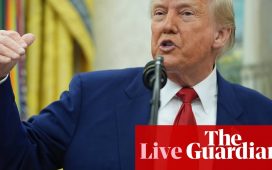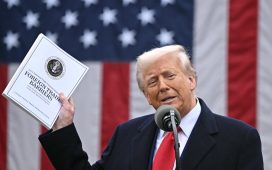Summary
If you’re just joining us, here’s a rundown of the latest developments:
-
US President Donald Trump has unveiled sweeping tariffs on some of the country’s largest trading partners. Trump said he would impose a 10% universal tariff on all imported foreign goods in addition to “reciprocal tariffs” ranging from 20% to more than 40% on dozens of countries.
-
China was hit with a 34% fee, in addition to a 20% tariff on all Chinese imports already in place, while the EU will now be levied at 20% and Japan at 24%. Trump said America had been “looted, pillaged and raped” by its trading partners: “In many cases, the friend is worse than the foe.”
-
The 10% universal tariff will go into effect on 5 April while the reciprocal tariffs will begin on 9 April.
-
Stocks dived after the announcement, with technology shares particularly hard hit, while the price of gold hit a record high as investors scrambled for safety. Japan’s Nikkei was down 2.8% on opening, Hong Kong’s Hang Seng Index slid 1.6%, South Korea’s Kospi fell 2% and Australian shares fell 2%.
-
US tariffs are a “major blow” to the world economy and the EU is preparing counter measures that will apply if negotiations fail, EU Commission chief Ursula von der Leyen has said. “The global economy will massively suffer, uncertainty will spiral and trigger the rise of further protectionism,” she said.
-
China’s commerce ministry called for Washington to “immediately cancel” the new tariffs, warning they “endanger global economic development” and would hurt US interests and international supply chains. It called for dialogue and added: “There is no winner in a trade war, and there is no way out for protectionism.”
-
War-torn and economically struggling countries are among those facing the highest tariffs. Myanmar, which is in the middle of a civil war and which was hit by an earthquake last week, was hit with a rate of 44%, while Sri Lanka is facing a 44% tariff and Lesotho a rate of 50%.
-
The tariffs also hit the Heard Island and McDonald Islands, a group of barren, uninhabited volcanic islands near Antarctica, which form an external territory of Australia, as well as Norfol Island, which said it had no known exports to the US. Albanese said on Thursday: “Norfolk Island has got a 29% tariff. I’m not quite sure that Norfolk Island, with respect to it, is a trade competitor with the giant economy of the United States, but that just shows and exemplifies the fact that nowhere on earth is safe from this.”
Key events
Saxo: heightened risk of recession
Markets have been caught off guard by the severity of Trump’s tariffs, reports. Jacob Falkencrone, global head of investment strategy at investment platform Saxo.
He flags there are growing fears that the trade war could lead to stagflation (rising prices but no growth) or a recession.
“While Trump claims the move will invigorate US manufacturing, many economists warn of potential negative impacts on the economy. The tariff offensive marks a significant economic turning point. With the US now enforcing what amounts to the steepest trade barriers in a century, the risks are more than just theoretical—they are visible in real time, and they are mounting.”
“The immediate concern is the US economy, where the average effective tariff rate is jumping nearly 19 percentage points. That’s a direct tax on consumption and corporate costs, especially for industries relying on imported materials. The result? Higher prices, tighter margins, weaker growth—and a heightened risk of recession. Economists warn that these tariffs could accelerate the arrival of stagflation, where inflation rises even as the economy stagnates or contracts.”
“Globally, the picture is just as concerning. China could lose up to 2.4 percentage points of GDP growth, according to recent forecasts, and the ripple effects could hit Europe, Asia, and emerging markets hard. This isn’t just a US-centric problem—it’s a potential global slowdown in the making.”
The US dollar is being hurt by fears that Donald Trump’s trade war could drive America’s economy into a recession, says Raffi Boyadjian, lead market analyst at XM:
Worries about the economic consequences of Trump’s decisions were also reflected in the US dollar, as the currency slid on recession fears.
Investors upped their bets of Fed rate cuts to 80 basis points, fully pricing in three 25-bps reductions for the year.
The US dollar is one of the biggest losers of ‘Liberation Day’
The sell-off in the US dollar is accelerating, dragging the greenback down to a new six-month low.
The dollar is sliding against rival currrencies, pulling the dollar index down to its lowest level since October.
The US dollar has turned out to be one of the biggest losers of ‘Liberation Day’, says Daniela Sabin Hathorn, senior market analyst at Capital.com.
The bottom line is that uncertainty remains high — even without considering that some of these new tariffs might be cancelled or revised after a few days of negotiations. Rough estimates suggest the economic impact could be even greater than the Smoot-Hawley tariffs of the 1930s – a set of protectionist trade policies that raised import taxes and are widely believed to have worsened the Great Depression by triggering global retaliation and slowing international trade [see earlier post for more details].
This isn’t just about trying to balance trade — it’s more like the U.S. is trying to become completely self-reliant. The U.S. is attempting to produce and consume everything internally instead of relying on global trade. At this level of tariffs, the U.S. would basically isolate itself economically, cutting off most of the relations with other countries. It’s hard to imagine this being an improvement to the current situation.
UK better placed to withstand tariff turmoil, say T. Rowe Price
The UK economy will perform better than Europe this year, as the trade war drags the eurozone into recession, Tomasz Wieladek, chief European economist at T. Rowe Price, has predicted.
Wieladek predicts the UK will see a rise in cheaper imports, as goods producers look to avoid US tariffs:
The UK will be least affected by the new policies. I believe the overall negative effect on the UK economy will only be about 0.2-0.5% this year. This is mainly because trade diversion to the US via the UK is likely to be now significant. Plants producing anything in the UK will be more competitive than in the EU, which will support some domestic investment.
The UK is a trade deficit country, and President Trump has just created significant excess capacity across the world. UK households will now benefit from much cheaper goods, raising disposable income. Most importantly, the UK government implemented a large fiscal stimulus package six months ago, just in time to absorb the tariff hit.
Despite the headwinds, the UK will do better in 2025 than the EU. A mild recession in the euro area in 2025 is now probable. The ECB will cut rates below the neutral rate to 1-1.5%.
German economy minister Robert Habeck has suggested that US president Donald Trump will buckle under pressure from Germany and Europe as his trade war escalates.
Habeck told a news conference:
“That is what I see, that Donald Trump buckles under pressure, corrects his announcements under pressure, but the logical consequence is that he must also feel the pressure, and this pressure must now be exerted from Germany, from Europe.”
Wall Street’s ‘fear gauge’ has jumped sharply, a sign that there will be more volatility on the US stock markets.
The VIX index has jumped by around 19%, which Reuters says puts it on track for its biggest one-day gain since late January.
The Saxo Strategy Team say:
S&P 500 and Nasdaq futures dropped over 3% overnight, driving a surge in demand for protection. Today’s volatility will hinge on reactions from major economies like the EU, China, and Japan.
Sam Jones
The Spanish Wine Federation (FEV) has described Trump’s imposition of a 20% tariff on EU products as a “significant blow to Spanish wineries”, for whom the US is the second largest export destination, and the No 1 export destination when it comes to sparkling wines.
The FEV’s director general, José Luis Benítez, said today:
“The tariffs announced by the US are completely unjustified in the specific case of wine, considering that the current tariff gap between the tariffs applied by the EU and the US is minimal.”
Benítez warned that the measure would harm not only Spanish wine-makers but also US consumers, “who consume more wine than they produce”.
He also pointed out that the newly announced tariffs would be particularly damaging to small and medium-sized producers, which make up 99% of Spain’s wineries, as they have less capacity to diversify their exports and are more dependent on the main export markets.
The US market represents approximately 13% of Spain’s total foreign sales. In 2024, 97 million litres of wine were exported for a value of around €390m.
Japan ‘disappointed’ not to escape Trump tariffs
Japanese prime minister Shigeru Ishiba has said he is disappinted not to win an exemption from President Donald Trump’s new tariffs.
Ishiba also promised measures to help domestic industry deal with the fallout fromm the new 24% tariff which the US is imposing on imports from Japan.
Ishiba told reporters:
“We had been requesting that the U.S. government review its unilateral tariff measures at various levels and we are extremely disappointed and regret that such measures have been implemented nonetheless.”
He added that he will speak with president Trump as and when appropriate, saying:
“We will continue to strongly urge the U.S. to review its measures.”
Bond yields fall as investors fear recession
While shares are sliding today, there’s a big rally into government bonds.
The prices of US Treasury bills, UK gilts, German bunds, and other eurozone government debt are all rallying today.
This is pulling down bond yields (the rate of return on the debt), with 10-year UK gilt yields down 6 basis points at 4.581%.
That might, superficially, sound like good news for finance ministers, as it shows new borrowing will be cheaper.
The problem, though, is that bond prices are rising/yields are falling as investors fear the global trade war will lead to a global recession, prompring interest rate cuts.
Kathleen Brooks, research director at XTB, says US trade policy has thrown “a grenade into the global economy”.
Brooks explains:
The bond market is a big winner.
Yields are falling sharply everywhere. The UK and European 2-year yields are lower, as the market rushes to price in rate cuts from the ECB and the BOE, as central banks are likely to step up to ease some of the pain from the US’s new global trade policy. 10-year yields are also lower, for example the 10-year Gilt yield in the UK is down 6bps so far on Thursday.
The UK yield curve is flattening, which is a sign that bond investors are pricing in the chance of a recession. US yields are also lower, but not by the same amount as Europe, suggesting that bond investors could be worried about the inflationary impact on the US economy.
US tariff calculations raise “serious concerns about policy credibility”
There’s some surprise this morning that the White House appears to have used a rather blunt tool to calculate its new reciprocal tariffs.
Last night, Donald Trump brandished a board showing (he claimed) the tariffs which other countries were charging on the US. The new US tariffs have been set at half that rate.
However, rather than in-depth calculations, US officials have invented a formula based on the size of each country’s trade surplus.
Basically, the White House has taken the US’s goods trade deficit with each country and then divided it by the total amount of goods imported from that country.
[and then halved it, to get the new US tariff for each country, with a 10% minimum].
Deutsche Bank have crunched the numbers, and confirm:
Put simply, the bigger the nominal trade deficit a country has with the US adjusted for the absolute size of that country’s imports, the bigger the tariff.
The BBC’s Faisal Islam has posted the formula:
THREAD:
The so-called “reciprocal” tariff doesn’t reflect the tariffs charged elsewhere directly but essentially the size of a country’s trade surplus, which has been used as a proxy. The equation essentially is aimed at levying a fee that would get this surplus to zero. pic.twitter.com/ixft2c1RLj
— Faisal Islam (@faisalislam) April 3, 2025
Deutsche Bank say this approach to calculating the tariffs “raises serious concerns about policy credibility, undermining the USD [the dollar].”
They draw three conclusions:
First, the US administration is squarely focused on penalizing countries with larger trade deficits in goods (services are ignored). This determination is highly mechanical, rather than a sophisticated assessment of tariff and non-tariff barriers. It is also in line with the declaration of a national emergency on the trade deficit used as a legal justification for the tariffs.
Second, there is a very large disconnect between communication in recent weeks of an in-depth policy assessment of bilateral trade relationships with different countries versus the reality of the policy outcome. We worry this risks lowering the policy credibility of the administration on a forward-looking basis. The market may question the extent to which a sufficiently structured planning process for major economic decisions is taking place. After all, this is the biggest trade policy shift from the US in a century. Crucially, major additional fiscal decisions are lining up over the next two months.
Third, the tariff calculation approach arguably makes for a more free-wheeling and open-ended nature to potential trade negotiations in coming months. It seems there are no specific and identifiable policy asks per se but ultimately a desire to reduce bilateral trade imbalances.
Scottish whisky and salmon industries “disappointed” by Trump tariffs

Severin Carrell
The Scottish whisky and salmon industries are “disappointed” with President Trump’s decision to impose 10% tariffs on British imports but have backed Keir Starmer’s efforts to win concessions from the US.
The Scotch Whisky Association said:
“The industry is disappointed that Scotch whisky could be impacted by these tariffs. We welcome the intensive efforts by the UK government to reach a deal with the US administration, and we continue to support this measured and pragmatic approach towards a mutually beneficial resolution.”
Tavish Scott, chief executive of Salmon Scotland, said:
“We have great confidence that Americans will continue to buy nutritious Scottish salmon, particularly when the country is reliant on imports to meet US consumer demand.
“Salmon producers want a business-like and stable trade relationship with the USA, so we support the UK government’s efforts to achieve that outcome through a calm and measured approach.”
Both sectors rely very heavily on US sales, particularly at the luxury end of their markets. The US is their second largest foreign customer. Industry bodies had been briefed by UK government officials that Trump’s tariffs on the UK could hit 20% so are likely to be relieved they were half that.
Scotland exports around £4bn worth of goods to the US, with whisky nearly a quarter of that trade at £971m last year. The US also bought £225m worth of Scottish salmon, which is the UK’s largest global food export by value, in 2024.
The tariffs will hit US businesses which rely on whisky and salmon. Kentucky bourbon makers sell their used barrels to Scotland for malt whisky maturation, so a fall in sales could hit that. High end US restaurants use premium Scottish salmon, airfreighted in from the UK.
US tariff burden could be higher than under Smoot-Hawley
Economists have calculated that the US tariffs would hit their highest level in over a century if the measures announced by Donald Trump last night are implemented in full.
Capital Economics have calcualted that the effective tariff rate on all imports will rise from 2.3% last year to around 26%, leaving it at a 131-year high, once you add the new reciprocal tariffs to the earlier hikes on goods from China, and the product-specific tariffs on steel, aluminum and autos.
They told clients:
Stepping back, the main message from President Trump’s “Liberation Day” announcement was that US tariffs were increased by more than even we had anticipated. Since election day, we have built our forecasts on an assumed that the US would impose a tariff of 60% on imports from China and 10% on imports from all other countries. That would take the effective US tariff rate to around 17%.
Instead, the system of reciprocal tariffs that was announced, together with the additional product-specific tariffs that appear imminent, will take the effective US tariff rate to just under 25%.
That, according to this chart from Capital Economics, would take the effective tariff rate higher than under the infamous Smoot-Hawley Tariff Act of 1930.
The Smoot-Hawley Tariff Act was brought in early in the Great Depression, as a protectionist measure to help US companies. But it is generally accepted it worsened the slump, which followed the Great Crash of 1929, by weakening global trade.
As Dr Eric Golson, Associate Professor of Economics at the University of Surrey, recently explained:
History has shown that trade wars come with long-term economic pain. The Great Depression was exacerbated by an international tariff war, with global trade plummeting by 66% between 1929 and 1933, crippling American businesses and driving unemployment to catastrophic levels.
UBS have also calculated that the“US weighted average import tariff is back to pre-WW I levels”.
They told clients:
Combining all the tariffs, we believe the weighted average tariff for the US has increased to 24%, from just 2.5% at the start of the year, a 21.5pp increase, and equivalent to a $715bn increase in dollar terms.
Israeli finance minister Bezalel Smotrich has said he is convening ministry officials to formulate a course of action to protect Israel’s economy in the wake of President Donald Trump’s decision to impose tariffs on exports.
As part of a sweeping new tariff policy, Israeli goods exports to the United States will be subject to a 17% tariff.
Smotrich said he would discuss with ministry officials, after speaking with economic leaders, how to “analyse opportunities and risks and formulate courses of action, both in relation to President Trump and his team and regarding the necessary steps to strengthen Israel’s industry”.
Pharma’s tariff reprieve could be temporary
Pharmaceuticals companies are avoiding the sell-off this morning, after avoiding the tariffs announced last night.
The fact sheet issued by the White House last night explains:
-
Some goods will not be subject to the Reciprocal Tariff. These include: (1) articles subject to 50 USC 1702(b); (2) steel/aluminum articles and autos/auto parts already subject to Section 232 tariffs; (3) copper, pharmaceuticals, semiconductors, and lumber articles; (4) all articles that may become subject to future Section 232 tariffs; (5) bullion; and (6) energy and other certain minerals that are not available in the United States.
That has prompted a small relief rally; in London, GSK are up 1.5% while AstraZeneca has risen by 0.6%. Switzerland’s Novartis has gained 0.65%.
But this could be short-lived, as Trump might yet announce more sector-specific tariffs.
As Bloomberg explains:
The president is looking into launching a so-called 232 investigation into pharmaceuticals and other sectors, including semiconductors and potentially critical minerals, according to a senior administration official. That action could lead to tariffs under the Trade Expansion Act, as it already has for cars and aluminum.
Interest rate cuts look more likely
City investors are ratcheting up bets on interest rate cuts by major central banks, as policymakers try to fend off a global recession.
The money markets are now pricing in a 92% chance that the European Central Bank cuts eurozone interest rates at its meeting later this month, up from 80% on Wednesday.
The chances of a Bank of England rate cut in early May have also risen, to 77%.
Standard Chartered, the Asia-Pacific focused lender, are the biggest faller on the FTSE 100 this morning, down 7.5%
That reflect concerns that parts of Asia has been hit particularly hard by Trump’s new traade levies.
As ING analysts told clients:
President Trump’s punitive tariffs hit Asia, with largest levies on Vietnam and smaller textile exporters. The largest economies in the region, such as India, Japan, and South Korea, fared better.
Overall, downside risks to growth and inflation could accelerate monetary policy easing and add to depreciation pressures on currencies.
European markets join the rout
European stocks have joined the global sell-off with gusto.
The pan-European Stoxx 600 index has fallen 1.5% at the start of trading, to its lowest level in over two months.
Germany’s DAX fell almost 2.5% at the start of tading in Frankfurt, while in Paris the CAC 40 is down 2.2% and Spain’s IBEX lost 1.5%.
Roman Ziruk, senior market analyst at global financial services firm Ebury, says:
“Trump’s “Liberation Day” announcements landed at the very negative end of market expectations, with the average tariff rate rising to over 20% from just 2.5% before Trump took office, the highest level since the early 20th century.
“Asian countries were hit the hardest, with some seeing punishing reciprocal tariffs of over 40% and China being hit with a massive 34% levy on top of the 20% already imposed since the start of Trump’s second term.
“On the other side of the spectrum are the UK and major Latin American countries, which were slapped with at most a 10% duty, with the EU in the middle at 20%.







